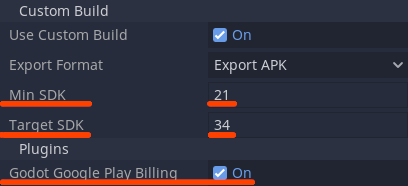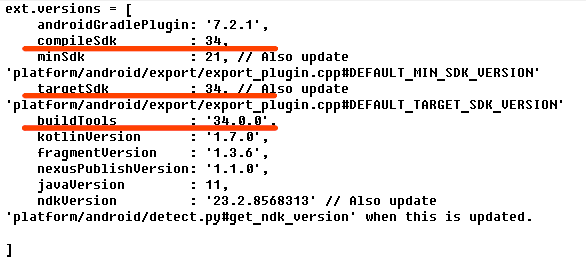A Godot plugin for integrating Google Play Billing Library version 6 with Godot 3.5.2 (Can also be used for newer 3.X-4.X versions, but requires a little bit more work. See bellow for more info.)
- One-time in-app purchases
- Repeat in-app purchases
- Subscriptions
If you want me to continue developing the plugin and keeping it up-to-date, please support me by:
Please also consider giving a star ⭐ to the plugin repository if you found it useful.
A big thank you to the following people for their sponsorship:
Google Play Store:
- "Ugly Button Adventure" by Magikelle Studio aka Ugly Button
- "Ugly Button 2" by Magikelle Studio aka Ugly Button
- "Stunt Riders" by Magikelle Studio aka Ugly Button
- "Lifty Circus Action Platformer" by Magikelle Studio aka Ugly Button
- "Galaxius: Space Battle" by Galaxius Games
For information on version deprecation, visit: Google Play Billing Library Deprecation FAQ
If there is no release for your Godot version, you will need to generate a new plugin .aar file.
-
Go to the downloads page of your desired Godot version
-
Click "Show all downloads"
-
Download the .AAR Library
-
Clone this repository
-
Place the newly downloaded .AAR file into the root of the cloned repository
-
In the 'app' folder, change the following line on the
build.gradlefile:from this:
compileOnly 'org.godotengine:godot:3.5.2.stable'to this:
compileOnly fileTree(dir: '..', include: ['godot-lib*.aar']) -
Open a command window (or terminal) and cd into the
godot-google-play-billing-6directory, then run the appropriate command:-
Windows:
gradlew.bat build
-
Linux:
./gradlew build
The newly generated .AAR plugin file will be located in
app/build/outputs/aar -
-
Take the 'release' .AAR file from the directory above, along with the
GodotGooglePlayBilling.gdapfile from the root directory, and place them both in your Godot project underandroid/pluginsCopy the newly created
.aarand.gdapfiles to your plugin directory:from
app/build/outputs/aar/GodotGooglePlayBilling-6.X.X-release.aarto[your godot project]/android/plugins/and
from
GodotGooglePlayBilling.gdapto[your godot project]/android/plugins/
After that, you will have a plugin for the Godot version you need.
Don't forget to enable the plugin in Godot under your export settings!
Alternatively, you can download the precompiled plugin files for Godot 3.5.2 from the releases page.
-
Check your Android export template settings. You need to specify a minimum SDK version of 21 and a target SDK version of 34 to meet the Google Play target platform requirements.
-
Check the
android/build/config.gradlefile and make any necessary changes to the SDK version specification. -
In the Android export template "Options" section under "Permissions", set "Access Network State" and "Internet" to "On". Also, add the following permission under "Custom Permissions":
com.android.vending.BILLING(this may be required).
- Create a singleton instance of the plugin and add it to the AutoLoad section in Project Settings.
- Call the function
pay(name_product)with the desired purchase name to initiate the purchase process.
extends Node
const NON_CONSUMABLE_ITEMS:Array = ["purchase1", "purchase2", "purchase3"] # Non-consumable items
const CONSUMABLE_ITEMS:Array = ["pay1", "pay2"] # Consumable items
const SUBSCRIPTION_ITEMS:Array = ["subscription1", "subscription2"] # Subscription items
var payment = null
var test_item_purchase_token = null
var purchasable_inapp:Dictionary = {}
var purchased_inapp:String = ""
var to_buy_item:String = ""
func _ready() -> void:
if Engine.has_singleton("GodotGooglePlayBilling"):
payment = Engine.get_singleton("GodotGooglePlayBilling")
payment.setLogLevel(0) # Set log level: 0 - none, 1 - enabled
payment.setLogTag("godot") # Set TAG for log
_connect_signals() # Connect signals to the payment object
print("Starting connection to Google Play Billing...")
payment.startConnection() # Start connection to the billing service
func _connect_signals():
# Connect various signals for handling billing events
payment.connect("connected", self, "_on_connected")
payment.connect("disconnected", self, "_on_disconnected")
payment.connect("connect_error", self, "_on_connect_error")
payment.connect("purchases_updated", self, "_on_purchases_updated")
payment.connect("purchase_error", self, "_on_purchase_error")
payment.connect("product_details_query_completed", self, "_on_product_details_query_completed")
payment.connect("product_details_query_error", self, "_on_product_details_query_error")
payment.connect("purchase_acknowledged", self, "_on_purchase_acknowledged")
payment.connect("purchase_acknowledgement_error", self, "_on_purchase_acknowledgement_error")
payment.connect("purchase_consumed", self, "_on_purchase_consumed")
payment.connect("purchase_consumption_error", self, "_on_purchase_consumption_error")
payment.connect("query_purchases_response", self, "_on_query_purchases_response")
func _on_connected():
print("CONNECTED!")
yield(get_tree().create_timer(2), "timeout") # Wait for 2 seconds
# Request product details for all items
var all_items = NON_CONSUMABLE_ITEMS + CONSUMABLE_ITEMS
payment.queryProductDetails(all_items, "inapp")
payment.queryProductDetails(SUBSCRIPTION_ITEMS, "subs")
# Query information about purchased items
payment.queryPurchases("inapp")
payment.queryPurchases("subs")
func _on_product_details_query_completed(sku_details):
print("Product details query completed: " + str(sku_details))
# Store details of each purchasable item
for available_sku in sku_details:
purchasable_inapp[available_sku.productId] = available_sku
var item_price = available_sku["price"]
print("Price for %s is %s" % [available_sku["productId"], item_price])
match available_sku["productId"]:
"purchase1":
print("Currency Code: ", available_sku["currencyCode"])
print("Description: ", available_sku["description"])
print("Formatted Price: ", available_sku["formattedPrice"])
print("Price: ",available_sku["price"])
print("Product ID: ",available_sku["productId"])
print("Title: ", available_sku["title"])
print("Type: ", available_sku["type"])
func _on_product_details_query_error(code, message, list):
print("SKU details query error %d: %s" % [code, message])
print("Requested products: ", str(list))
func _on_query_purchases_response(query_result):
print("query_purchases_response Check!")
if query_result and query_result.status == OK:
if query_result.purchases.empty():
print("query_result.purchases is empty!")
else:
print("query_result.purchases = ", query_result.purchases)
# Check if there are any non-consumable, consumable purchases, or subscriptions
for purchase in query_result.purchases:
if purchase.productId in NON_CONSUMABLE_ITEMS and purchase.purchaseState == 1:
print("Non-consumable purchase found!")
elif purchase.productId in CONSUMABLE_ITEMS and purchase.purchaseState == 1:
print("Consumable purchase found!")
elif purchase.productId in SUBSCRIPTION_ITEMS and purchase.purchaseState == 1:
print("Subscription purchase found!")
else:
print("Failed to query in-app purchases.")
func _on_purchases_updated(purchases):
# Handle updated purchases
for purchase in purchases:
if not purchase.isAcknowledged:
if purchase.productId in NON_CONSUMABLE_ITEMS:
payment.acknowledgePurchase(purchase.purchaseToken) # Non-consumable purchase
elif purchase.productId in CONSUMABLE_ITEMS:
payment.consumePurchase(purchase.purchaseToken) # Consumable purchase
if purchases.size() > 0:
# Store the last purchase token
test_item_purchase_token = purchases[purchases.size() - 1].purchaseToken
func _on_purchase_acknowledged(_purchase_token):
print("Purchase acknowledged: %s" % purchased_inapp)
# Handle the acknowledged purchase
_handle_purchase(purchased_inapp)
# Additional query information about purchased items after acknowledgement
payment.queryPurchases("inapp")
payment.queryPurchases("subs")
func _on_purchase_consumed(_purchase_token):
print("Purchase consumed: %s" % purchased_inapp)
# Handle the consumed purchase
_handle_purchase(purchased_inapp)
func _handle_purchase(product_id):
# Handle specific purchases based on the product ID
match product_id:
"purchase1":
print("Handling purchase1")
"purchase2":
print("Handling purchase2")
"purchase3":
print("Handling purchase3")
"pay1":
$"/root/User".monet += 250
$"/root/User".save()
$"/root/Global".pay_true = true
"pay2":
$"/root/User".monet += 1500
$"/root/User".save()
$"/root/Global".pay_true = true
"subscription1":
print("Handling subscription1")
"subscription2":
print("Handling subscription2")
func _on_purchase_error(code, message):
print("Purchase error %d: %s" % [code, message])
func _on_purchase_acknowledgement_error(code, message):
print("Purchase acknowledgement error %d: %s" % [code, message])
func _on_purchase_consumption_error(code, message, purchase_token):
print("Purchase consumption error %d: %s, purchase token: %s" % [code, message, purchase_token])
func _on_disconnected():
print("GodotGooglePlayBilling disconnected. Will try to reconnect in 10s...")
yield(get_tree().create_timer(10), "timeout") # Wait for 10 seconds
payment.startConnection() # Attempt to reconnect to the billing service
func pay(name_product):
# Initiate purchase for the specified product
if name_product in NON_CONSUMABLE_ITEMS or name_product in CONSUMABLE_ITEMS or name_product in SUBSCRIPTION_ITEMS:
var type = "inapp"
if name_product in SUBSCRIPTION_ITEMS:
type = "subs"
print("Initiating purchase for product: %s" % name_product)
print("Initiating purchase with type: %s" % type)
payment.purchase(name_product, type, "", "")
else:
print("Invalid product: %s" % name_product)I am actively working on making the plugin even more user-friendly. Here’s what I have planned:
I plan to redesign the plugin so that users will only need to add a single class as a node in their project. This class will handle all billing operations and allow for configuration of items (one-time purchases, repeat purchases, and subscriptions) directly through exported variables.
The new design will make it easier to specify purchase items and manage billing operations with minimal setup.
Stay tuned for updates, and feel free to open an issue or contribute if you have any suggestions or feedback!






